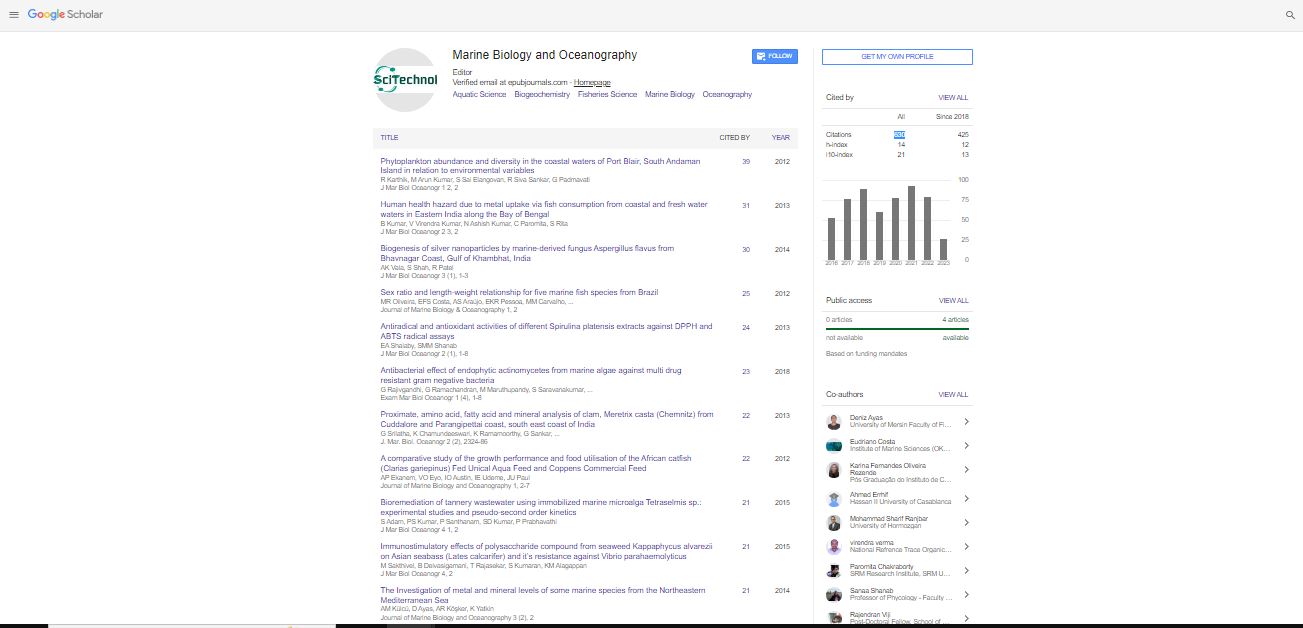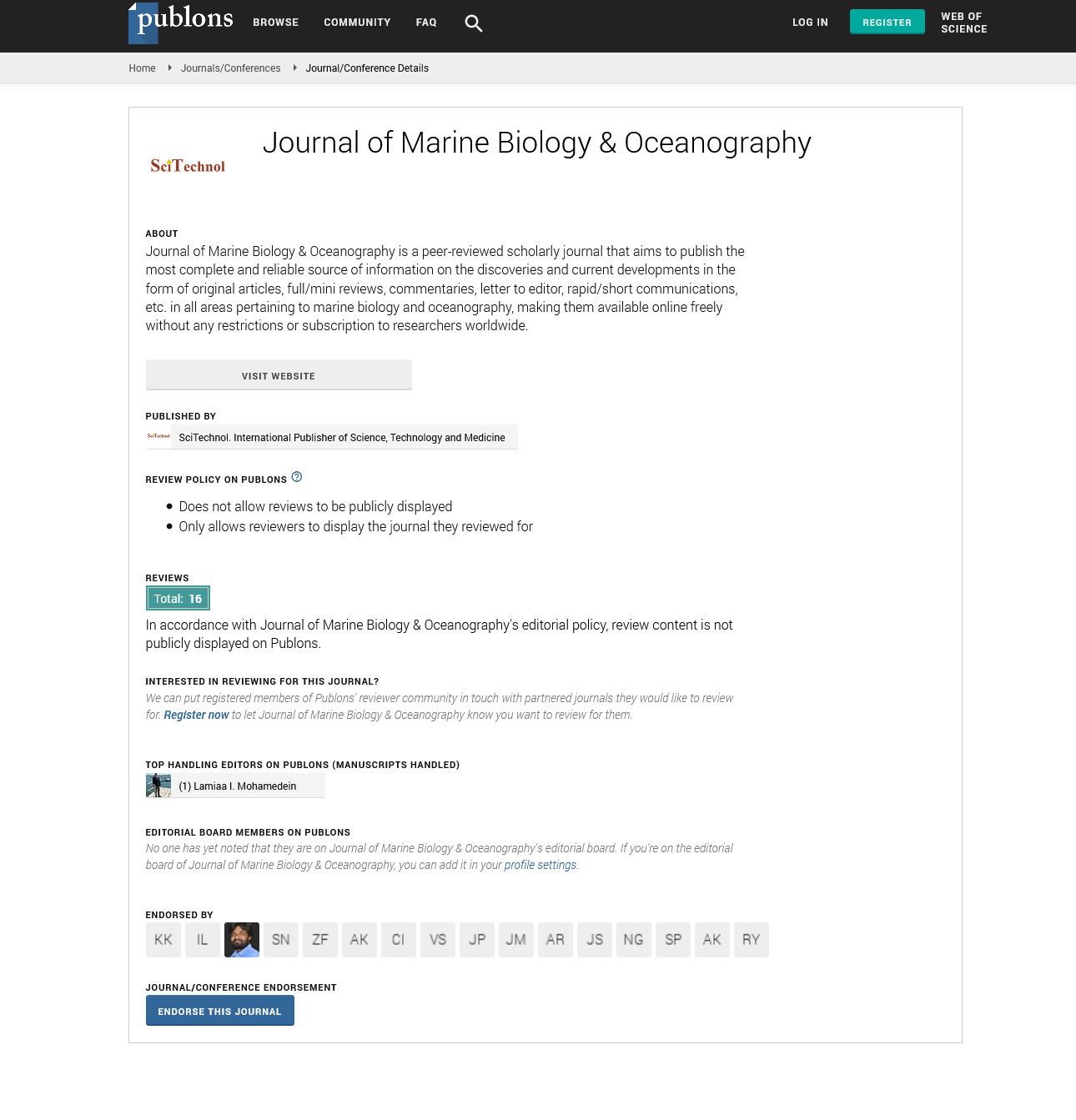Perspective, J Mar Biol Oceanogr Vol: 12 Issue: 2
Exploring the Essential Role and Potential Uses of Marine Conservation
Hollie Myron*
Department of Ecology, Aristotle University of Thessaloniki, Thessaloniki, Greece
*Corresponding Author: Hollie Myron
Department of Ecology
Aristotle University of Thessaloniki
Thessaloniki, Greece
E-mail: holliemyron@auth.gr
Received date: 22 March, 2023, Manuscript No. JMBO-23-98721;
Editor assigned date: 24 March, 2023, PreQC No. JMBO-23-98721 (PQ);
Reviewed date: 07 April, 2023, QC No. JMBO-23-98721;
Revised date: 14 April, 2023, Manuscript No. JMBO-23-98721 (R);
Published date: 21 April, 2023, DOI: 10.4172/2324-8661.1000258
Citation: Myron H (2023) Exploring the Essential Role and Potential Uses of Marine Conservation. J Mar Biol Oceanogr 12:2.
Description
The oceans cover more than 70% of the planet and are vital for sustaining life on earth. They provide habitat for countless marine species, generate oxygen, regulate the climate, and provide economic opportunities for millions of people. However, these invaluable resources are under threat from numerous challenges, including overfishing, pollution, habitat destruction, and climate change. In response, marine conservation has emerged as an essential field dedicated to protecting and preserving marine ecosystems. Marine conservation plays a vital role in maintaining the balance and resilience of marine ecosystems. By protecting biodiversity and ensuring the health of habitats, it contributes to the overall well-being of the planet. Healthy oceans are not only important for the marine species but also for human populations. For millions of people, particularly those in coastal communities, oceans provide a source of livelihood, food security, and cultural significance.
One of the primary goals of marine conservation is to prevent overfishing and promote sustainable fisheries management. By implementing measures such as fishing quotas, gear restrictions, and marine protected areas, conservation efforts aim to restore fish populations to healthy levels and maintain the integrity of marine food webs. Sustainable fisheries management not only preserves fish stocks but also supports the livelihoods of fishing communities and ensures the availability of seafood for future generations. Additionally, marine conservation addresses the threat of pollution in marine environments. This includes reducing and preventing pollution from land-based sources, such as agricultural runoff, industrial waste, and plastic debris. By minimizing pollution, conservation initiatives protect marine life, maintain water quality, and safeguard the integrity of coastal ecosystems.
Marine conservation employs various strategies and applications to achieve its objectives. One major approach is the establishment of Marine Protected Areas (MPAs), which are designated zones that restrict certain activities to protect biodiversity and promote the recovery of ecosystems. MPAs serve as sanctuaries for marine species, allowing them to reproduce, feed, and seek refuge from human impacts. These areas are essential for preserving biodiversity hotspots, restoring damaged habitats, and promoting the long-term health of marine ecosystems. Another significant application of marine conservation is the promotion of sustainable aquaculture practices. With global demand for seafood on the rise, aquaculture has become an important industry. However, poorly managed aquaculture operations can lead to environmental degradation and harm wild fish populations. Through sustainable aquaculture practices, such as responsible feed management, minimizing disease outbreaks, and reducing the ecological footprint, marine conservation ensures that the growth of this industry is ecologically and socially responsible. Furthermore, public awareness and education are essential components of marine conservation. By raising awareness about the importance of oceans and the threats they face, conservation efforts seek to mobilize individuals, communities, and governments to take action. Education programmes, community engagement initiatives, and public outreach campaigns play a vital role in fostering a sense of stewardship and encouraging sustainable practices, such as responsible tourism and responsible seafood consumption.
Conclusion
The field of marine conservation is essential to maintaining the sustainability and health of the oceans. Through its role in protecting biodiversity, promoting sustainable fisheries, addressing pollution, establishing marine protected areas, encouraging responsible aquaculture, and supporting, and raising public awareness, marine conservation plays an essential part in preserving marine ecosystems for future generations. However, the challenges facing marine conservation are vast and complex. Climate change, ocean acidification, and habitat destruction pose significant obstacles to the preservation of marine ecosystems. Therefore, it is essential for governments, organisations, and individuals to collaborate and implement effective conservation strategies.
 Spanish
Spanish  Chinese
Chinese  Russian
Russian  German
German  French
French  Japanese
Japanese  Portuguese
Portuguese  Hindi
Hindi 
